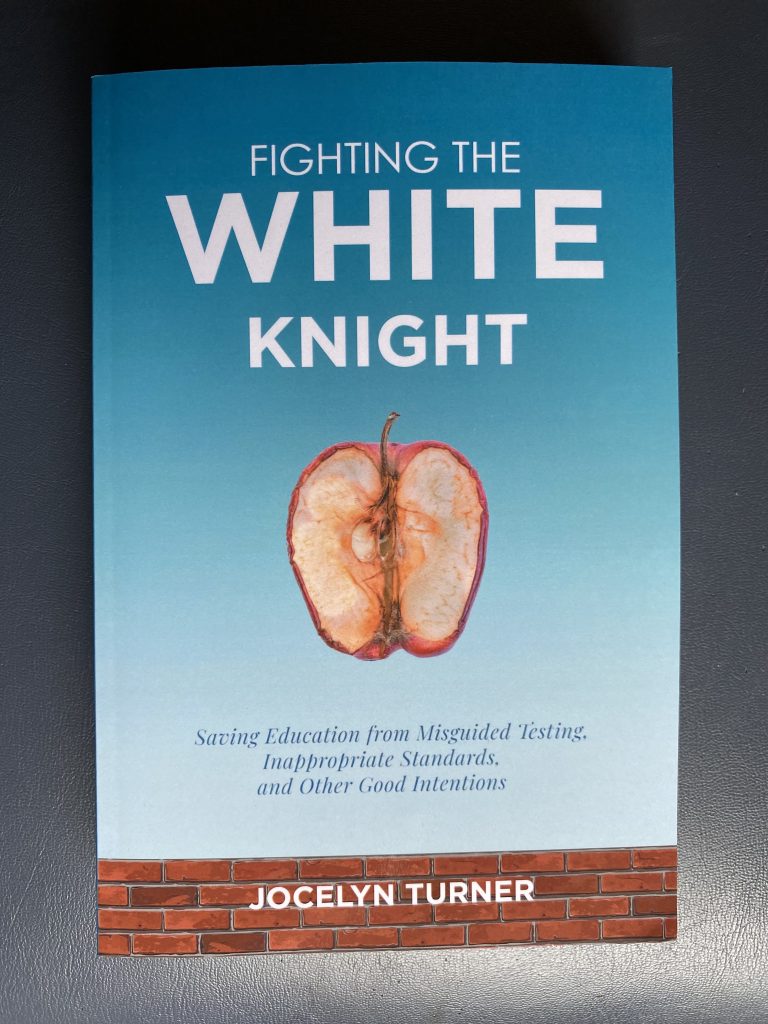
Can we save education from today’s onslaught of misguided testing and inappropriate — sometimes even ridiculous — standards? What about the other codified and uncodified good intentions that keep upending our classrooms? That subtitle above is a mouthful and it doesn’t even explicitly capture my chapter on the student loan debacle.
My recently published book can easily be found by putting “Fighting the White Knight Jocelyn Turner” into a search engine. That single act awes me a little. Amazon, Barnes and Noble, and so many little bookstores and unfamiliar websites seem to have my book. Poshmark even lists a couple of copies.
Reader, I would be so happy if you would order my book. Kindle and ebook copies are available. I hope for kind reviews, although I also expect to get slammed by some readers. I am calling the current system broken, while demanding that we increase educational time and funding to cover remedial education. I want a longer school year in some places, as well as more consideration for “old-fashioned” educational approaches that do work when appropriately applied.
The system has to change. Piecemeal fixes and occasional grants have not been narrowing the achievement gap. I expected the post-COVID gap to widen significantly, and the data has been bearing me out. A reading and math disaster has been underway, and reading is the foundation upon which all educational success ultimately rests. That disaster unsurprisingly kicked the kids hardest who were already down.
To quote from https://hechingerreport.org/massive-learning-setbacks-show-covids-sweeping-toll-on-kids/:
“… the average student lost more than half a school year of learning in math and nearly a quarter of a school year in reading – with some district averages slipping by more than double those amounts, or worse. Online learning played a major role, but students lost significant ground even where they returned quickly to schoolhouses, especially in math scores in low-income communities.
When you have a massive crisis, the worst effects end up being felt by the people with the least resources,” said Stanford education professor Sean Reardon, who compiled and analyzed the data along with Harvard economist Thomas Kane.*
Yes, the US educational system works wonderfully in many lucky locations. I live in a district that sometimes makes national news because of its first-rate schools. We lost ground to COVID locally, but comparatively came out not too badly damaged — and my neighbors have a long history of hiring expensive tutors to fill in learning gaps.
But I worked elsewhere. I have seen the effect of property-tax-based school funding in areas where houses are cheap and industry scarce. I have seen what happens when remediation does not happen; children who are lost become more lost because bodies and hours needed to fill in past learning gaps simply don’t exist. Those districts with more money can hire more paraprofessionals, but our least financially endowed districts may even struggle to buy enough paper. Parents who are struggling to make the rent because of rising food costs are not hiring tutors or checking out Kumon classes.
So I wrote a book. I am cleaning up a second book right now, one that helps explain in detail how No Child Left Behind and the Common Core failed to bring us out of today’s harsh, luck-of-the-zipcode landscape. I promise readers that “Fighting the White Knight” contains a great deal of food for thought.
Join me in my journey?
Social media sites where I can be found:
- pinterest.com/jocelyntheplaid (2 education sections and some fine iced coffee recipes, etc.)
- facebook.com/jocelyn.turner.75
- instagram.com/shastatheplaid (mostly watercolors)
- biographyjar.com (just for fun — education has only bled into the fabric on occasion)
- I am almost nonexistent on the former Twitter now, but I may rejoin the group when the dust settles, if enough of the old crowd are still there.
*https://hechingerreport.org/massive-learning-setbacks-show-covids-sweeping-toll-on-kids/
